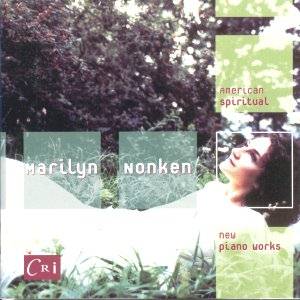AMERICAN SPIRITUALS : NEW PIANO
WORKS
Jeff NICHOLLS: Chelsea Square
(1999)
Jason ECKARDT: Echoes' White Veil
(1996)
Michael FINNISSY: North American
Spirituals (1998)
Milton BABBITT: Allegro Penseroso
(1999)
 Marilyn Nonken
(piano)
Marilyn Nonken
(piano)
Recorded 1997 (Eckhardt) and
2000
 CRI CD 877
[57:32]
CRI CD 877
[57:32]
CRI

Jeff Nicholls (b. 1957) is a name new to me, and so is his music which
I find the most readily accessible in this exacting and thought-provoking
collection of recent works for piano, all written for Marilyn Nonken.
Chelsea Square alludes to a similarly titled poem by Douglas Crase,
and, for this listener at least, evokes the buzzing life, with all its contrasts,
of a big city. Nicholls' music is well-written for the piano; it is colourful
somewhat jazzy but quite demanding.
Jason Eckardt (b. 1971) is the youngest composer here who relates
to the so-called "New Complexity school", and his music has many affinities
with that of Ferneyhough, Finnissy or Dillon. His Echoes' White Veil is
a fairly complex and technically taxing piece of music. It falls roughly
into two sections : the opening section is, to say the least, hyperactive
and ends with a long-reverberating chord followed by a long pause. The second
section is somewhat calmer, the music more rarefied with many silences though
with huge dynamic contrasts. The piece is written without bar-lines and has
some improvisatory character, the whole giving the impression of a restless,
sometimes violent burst of creative energy. The music is again very taxing
and Marilyn Nonken rightly remarks that "the effort required to play the
piece is an integral part of its aesthetic". Quite an impressive achievement
in its own right.
Michael Finnissy is probably one of the best known composers in this
collection. A brilliant pianist, he has written quite extensively for his
instrument, both short pieces and large-scale ones. North American Spirituals
written in 1998 for Marilyn Nonken is the second chapter of the second
book of his huge piano work (or should I say cycle) The History of Photography
in Sound which lasts five hours and a half in performance and of which
a complete performance took place in London a few months ago. This is by
far the most substantial work here. The basic material for Finnissy's
explorations consists in four negro spirituals which were used by Michael
Tippett in his oratorio A Child of Our Time. Those who already know
Finnissy's English Country Tunes or his more recent Verdi and Gershwin
arrangements will know what to expect from the present piece. The tunes of
the spirituals are deeply imbedded in the complex, busy piano textures. Finnissy
uses the original tunes as material to be transformed in countless ways according
to his own fancy. "They dissolve into each other, are clear one moment and
blurred the next, in the distance or in close-up etc." (Geoff Hannan in Tempo
No.216 April 2001). Indeed you will hardly recognize the tunes, well known
as they are. Finnissy delights in transforming them beyond recognition by
splitting them into pieces, focusing on a tiny detail and emphasizing it,
by blurring the melodic and rhythmic contours, by adding allusions to Billings
and Ives, by exploiting the full dynamic and tonal range of the piano. This
is a really impressive piece, though a quite difficult one.
Milton Babbitt is the "Grand Old Man" here though his Allegro
Penseroso, written as recently as 1999, is a brilliant, youthful piece
"concise and articulate, yet exuding boundless energy and invention" (Marilyn
Nonken). This fine work provides for a brilliant conclusion to this absorbing
recital.
Marilyn Nonken plays all these pieces with a remarkable technical assurance
and a fine musicianship. Her technique is never in doubt and her grasp of
the music is really overwhelming. This release provides for a superb anthology
of recent, difficult piano works which are all well worth hearing and which
repay repeated hearings, though some may find that this is too much for their
stomachs. I would then suggest not to listen to this CD in one sitting but
rather to hear each piece separately several times before sitting once again
through it all.
Hubert Culot

